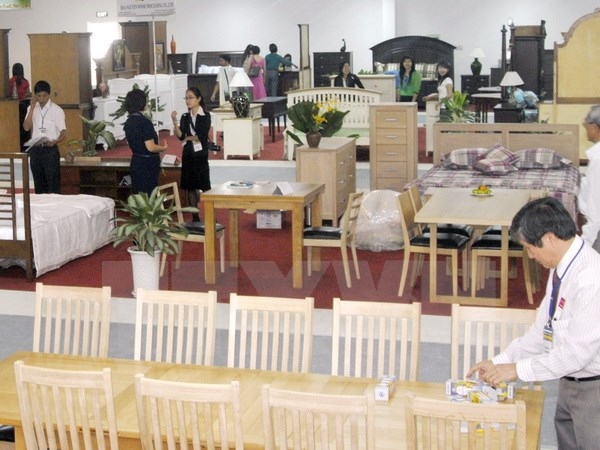 Economy
Economy

Fair trade is now one of the most important concerns for European Union (EU) consumers, along with concern for sustainable development, a Ministry of Trade and Industry official said.
 |
| Wood products dislpays at a showroom of a home decoration company. Fair trade is now one of the most important concerns for European Union (EU) consumers, along with concern for sustainable development.– VNA/VNS Photo Hoàng Hải |
HÀ NỘI – Fair trade is now one of the most important concerns for European Union (EU) consumers, along with concern for sustainable development, a Ministry of Trade and Industry official said.
Trần Ngọc Quân, deputy director general of the Europe Market Department, Ministry of Trade and Industry, made this observation at the policy dialogue “Promoting fair trade in Việt Nam” in Hà Nội yesterday.
The dialogue was held by the Việt Nam Rural Industries Research and Development Institute, in collaboration with Việt Nam Tea Association, Việt Nam Cocoa – Coffee Association and Việt Nam Handicraft Exporters’ Association.
“The FTA between Việt Nam and the EU has brought big advantages for the market and Vietnamese enterprises when exporting to the EU market,” he said.
“The EU cares for economic development with opportunities for future generations. As such, in the EU member states, especially more developed countries, consumers have higher requirements for products and services,” Quân highlighted, adding “The market requirement is strict, including requirements for producers for environment and society.”
If Vietnamese enterprises actively sought voluntary labels such as ecolabel, social responsibility and fair trade, it will give EU consumers more confidence while choosing Vietnamese products, he added.
According to EU statistics, EU revenue of fair trade products has increased steadily, especially for coffee, tea and handicrafts.
Fair trade represents 1.5 million producers and labour in 1,200 manufacturers in 74 countries, according to Nguyễn Bảo Thoa, director of the “Promoting fair trade in Việt Nam” project.
Speaking at the dialogue, Thoa said that for producers and labour, fair trade helped them by creating a fair and stable price for their products, welfare funds to re-invest into their community, empowerment to voice their opinions in decision making process, and improvement in working and living conditions based on the establishment of production, or a consumption model with responsibility.
For businesses, fair trade is a global certification for easier recognition, meeting market demands, pricing themselves according to the fair trade criteria, improving their organisational structures, and being part of a global market, in addition to exchanging opportunities to learn and voice their opinion on fair trade itself.
Consumers of fair trade will buy products according to values and rules of fair trade, choosing good products, with clear origin, showing producers’ responsibility to the economy, society and environment.
Fair Trade was a tool for delivering sustainable development, Christine Gent, director of World Fair Trade Organisation in Asian region, said.
Fair Trade supported sustainable rural livelihoods and helped to stem the tide of urban migration, she added.
However in Việt Nam, fair trade was relatively new and yet to be well known, Thoa said.
A coffee grower in Đắk Lắk Province said at the meeting that as soon as his co-operative applied fair trade practices, it saw improvements.
“The quality of coffee was enhanced, while the awareness of both planters and buyers on social responsibility increased,” he said.
However, as the province was still weak in financial capacity, he proposed to organisations that they support the co-operative with a fee to build a trade promotion brand, and hoped the Government would lend support through investment funds on materials.
A representative of the handicraft sector also spoke highly on the advantages of fair trade in exporting to foreign markets, especially the European Union (EU) market. She also recommended to the State that they have policies to attract more companies and enterprises taking part in fair trade activities to further promote fair trade in the country.
The project “Promoting fair trade in Việt Nam” is funded by EU with the total budget of more than 504,000 euro (US$574,000) in a period of 35 months from June 2014 to May 2017.
The project aims to develop and increase the fair trade business ability in Việt Nam following all requirements to the EU market. – VNS




